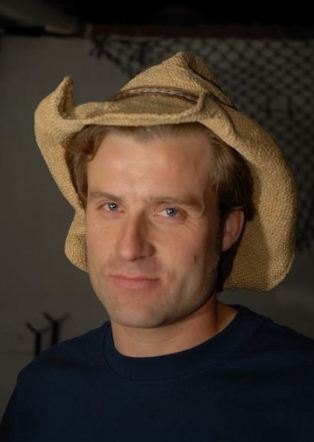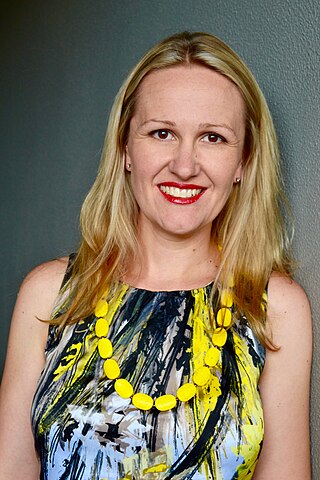
Sir Frank Macfarlane Burnet, usually known as Macfarlane or Mac Burnet, was an Australian virologist known for his contributions to immunology. He won a Nobel Prize in 1960 for predicting acquired immune tolerance and he developed the theory of clonal selection.
The National Institute of Arthritis and Musculoskeletal and Skin Diseases (NIAMS) is one of the institutes and centers that make up the National Institutes of Health, an agency of the United States Department of Health and Human Services (HHS).

WEHI, previously known as the Walter and Eliza Hall Institute of Medical Research, and as the Walter and Eliza Hall Institute, is Australia's oldest medical research institute. Sir Frank Macfarlane Burnet, who won the Nobel Prize in 1960 for his work in immunology, was director from 1944 to 1965. Burnet developed the ideas of clonal selection and acquired immune tolerance. Later, Professor Donald Metcalf discovered and characterised colony-stimulating factors. As of 2015, the institute hosted more than 750 researchers who work to understand, prevent and treat diseases including blood, breast and ovarian cancers; inflammatory diseases (autoimmunity) such as rheumatoid arthritis, type 1 diabetes and coeliac disease; and infectious diseases such as malaria, HIV and hepatitis B and C.
The American Association for Cancer Research (AACR) is the world's oldest and largest professional association related to cancer research. Based in Philadelphia, the AACR focuses on all aspects of cancer research, including basic, clinical, and translational research into the etiology, prevention, diagnosis, and treatment of cancer. Founded in 1907 by 11 physicians and scientists, the organization now has more than 58,000 members in 142 countries and territories. The mission of the AACR is to prevent and cure cancer through research, education, communication, collaboration, science policy and advocacy, and funding for cancer research.

Robert Peter Gale is an American physician and medical researcher. He is known for research in leukemia and other bone marrow disorders.

Lloyd John Old was one of the founders and standard-bearers of the field of cancer immunology. When Old began his career in 1958, tumor immunology was in its infancy. Today, cancer immunotherapies are emerging as a significant advance in cancer therapy.
Allied Academies is a reportedly fraudulent corporation chartered under the laws of North Carolina. Its postal address is in London, United Kingdom. It presents itself as an association of scholars, with supporting and encouraging research and the sharing and exchange of knowledge as its stated aims. The organization consists of 30 affiliate academies, which provide awards to academics and publish academic journals both online and in hard copy for members. Since 2015 the organization has been listed on Jeffrey Beall's list of "potential, possible, or probable predatory scholarly open-access publishers". It is in a partnership with OMICS Publishing Group which uses its website and logo. In 2018, OMICS owner Srinubabu Gedela declared that he had informed the Nevada court that Allied Academies was a subsidiary of OMICS International. During a conference in 2018, they falsely listed a prominent chemist among its organizing committee who had not agreed to this and was not affiliated with Allied Academies.
Francesco Dieli is an Italian immunologist. He was born in Prizzi, Italy. After high school education, in 1983 he got his degree with honors in Medicine at the University of Palermo where he specialized in Pathology. He got his PhD in Immunology in 1999. He is full professor of Immunology and Director of the Division of Immunology and Immunogenetics at the University of Palermo, Italy.

Jared Franklin Purton was an Australian-born immunologist who contributed to the understanding of how T cells function through his academic research. After his death in a car accident in 2009, the Jared F. Purton Foundation was set up in his memory to support charitable causes in the San Diego area.
Hannes Stockinger is an Austrian scientist, university professor and since 2010 Head of the Centre for Pathophysiology, Infectiology and Immunology and the Institute for Hygiene and Applied Immunology at the Medical University of Vienna.

Franca Ronchese is an Italian-New Zealand immunologist. She currently leads the immune cell biology programme at the Malaghan Institute of Medical Research in Wellington, New Zealand and is a research professor at Victoria University of Wellington.

Dipyaman Ganguly is an Indian physician-scientist immunologist and cell biologist, currently a Principal Scientist and Swarnajayanthi Fellow at the CSIR-Indian Institute of Chemical Biology (IICB). He heads the Dendritic Cell Laboratory of IICB, popularly known as the Ganguly Lab, where he hosts several researchers involved in research on regulation of innate Immunity and pathogenesis of inflammatory disorders. The Council of Scientific and Industrial Research, the apex agency of the Government of India for scientific research, awarded him the Shanti Swarup Bhatnagar Prize for Science and Technology, one of the highest Indian science awards for his contributions to Medical Sciences in 2022.

Mihai G. Netea is a Romanian Dutch physician and professor at Radboud University Nijmegen, specialized in infectious disease, immunology, and global health.

Tim Dominik Sparwasser is a German physician, microbiologist and infection immunologist. In 2018, he became director of the Institute for Medical Microbiology and Hygiene (IMMH) in Mainz.

Jessica Geraldine Borger is an Australian T Cell immunologist, lecturer and graduate course coordinator at the Central Clinical School, Monash University. Her research has added to the understanding of the molecular mechanisms of T cell function. Additionally, Borger is a news and commentary editor for Immunology & Cell Biology and a guest associate editor for Frontiers in Immunology, and a reviewer for several academic journals. Jessica also advocates for gender equality in science, technology, engineering and mathematics (STEM) in her position a member of the Gender Equity, Diversity and Inclusion committee of the Central Clinical School at Monash University.
Clinical & Translational Immunology (CTI). is an international academic journal of the Australian and New Zealand Society for Immunology (ASI).
Fabienne Mackay is a French Australian research immunologist and institutional leader within the Australian medical research, education and innovation sectors. She is the Director and CEO of the QIMR Berghofer Medical Research Institute since 2020, after being the inaugural Head of the School of Biomedical Sciences at the University of Melbourne during the preceding five years. She is also an Honorary Professor at the Faculties of Medicine of the University of Queensland and the University of Melbourne. Her work has attracted public attention for its contribution to the pathophysiological understanding and treatment of lupus and other autoimmune diseases. Mackay has been notably awarded, achieving international reputation for her widely cited research describing B-cell activating factor (BAFF) and other cytokines of the TNF receptor superfamily, and their roles in B cell physiology, autoimmunity and cancer. She is an elected Fellow of the Australian Academy of Health and Medical Sciences.
Lynn Corcoran is an American–Australian immunologist who is Professor of Immunology at the Walter and Eliza Hall Institute. Her research considers cancer, parasitology and immunology, with a focus on B cells biology. She was inducted into the Victorian government's Honour Roll in 2013.
Roslyn A. Kemp is a New Zealand immunologist, and as of 2023 is a full professor at the University of Otago. Her research focuses on T cells, mucosal and tumour immune responses, inflammation and T cell memory.








